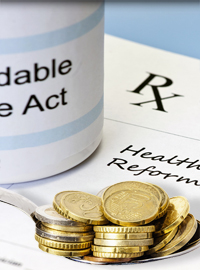| ObamaCare Exchanges Wasting Huge Sums of Taxpayer Money |
 |
|
By Ashton Ellis
Wednesday, May 14 2014 |
With ObamaCare’s enrollment season officially over, evidence is emerging that billions of taxpayer dollars have been spent funding waste, fraud and abuse. American Commitment's Phil Kerpen over at The Federalist paints a financially gruesome picture of how much federal taxpayer money has been wasted by state-based ObamaCare exchanges since 2011. Using grant data from the federal Centers for Medicare and Medicaid Services (CMS), Kerpen shows that of the $4.9 billion doled out to 37 states and the District of Columbia in seed money more than $1.2 billion can now be considered a failed investment. Almost half of the $1.2 billion figure comes from the shuttering of exchanges in Oregon, Massachusetts and Maryland – $655,256,153 combined. The remainder comes from struggling exchanges in Hawaii, Vermont, Minnesota and Nevada. All are either in the process of transitioning to Healthcare.gov – the federal exchange – or will soon be in a position where it is the only viable alternative. Of course, the financial hit to federal taxpayers could be reduced if states gave back their unused grant money. Oregon alone is holding onto $57 million. Instead, Oregon is refusing to refund, and Massachusetts and Maryland are applying for new money to build new exchanges. Only if those fail will they finally give up. Who can blame them? It’s not like it’s their money. The next piece of bad news is a new survey of ObamaCare exchange users by the consulting firm McKinsey revealing that only 26% of them were previously uninsured. An analysis by Avik Roy of the Manhattan Institute says that counting only those who’ve paid for their coverage – in other words, those who are actually covered – the number drops to 22%. To put this in context, recall that the Obama administration claims 8 million people signed up for health insurance via ObamaCare exchanges. Roy’s 22 percent translates into roughly 1.7 million of those. Roy identifies another 865,000 previously uninsured people who bought coverage outside the exchanges. Combined that’s 2,565,600 people who now have insurance coverage because of the health law’s mandates. So how much did this grand social experiment cost taxpayers? “Nationally, federal taxpayers have spent $4,633 per enrollee for each of the 8+ million who have signed up for Exchange coverage through April 19,” says a report from the Heartland Institute. “But this ranges from a low of $3,038 in Tennessee to a high of $24,947 in Hawaii.” For argument’s sake, taking the $4,633 average tells us a lot about what federal taxpayers are getting for their money. For example, we can estimate that government officials spent more than $12 billion ($12,045,800,000) for 2.6 million people to get partially subsidized health insurance for one year. On the flipside, bureaucrats spent more than $25 billion ($25,018,200,000) to partially subsidize people who already had insurance. When ObamaCare’s passage was being debated, supporters routinely cited America’s estimated 30 million uninsured as reason enough to vote in favor. A success rate of 11.5 percent, if not exactly fraud, is a serious case of political malpractice. Finally, there’s the story of abuse by a federal contractor gouging taxpayers for over $1 billion, yet doing almost no work. Serco, a subsidiary of a British firm hired to process paper applications when ObamaCare’s federal website crashed repeatedly, is being accused by current employees of overbilling the government. Various news sources quote disgruntled employees being “told to sit at their computers and hit the refresh button every 10 minutes, no more than every 10 minutes,” hoping they will find an application to process. However, the workload is so light many employees aren’t meeting the company’s goals of processing two applications a month. But that hasn’t slowed down Serco’s hiring frenzy. Oversight by the Centers for Medicare and Medicaid Services is so lax, Serco continues to staff up toward its 1,500-employee limit. According to an employee, Serco gets paid for each worker it hires – a point confirmed unintentionally by a CMS statement that “Serco is committed to making sure federal funds are spent appropriately, and the number of Serco staff is reviewed on a regular basis.” (Emphasis added) CMS should have seen this abuse coming. Only a year ago the British government began investigating allegations of overbilling by Serco Group, Serco’s parent company, to the tune of “tens of millions of pounds” under a contract to monitor parolees and those out on bail. As the evidence shows, ObamaCare may be great for liberal social engineers and greedy government contractors, but for taxpayers the results are massive spending deficits with only a disgracefully low number of legitimate beneficiaries. |
Related Articles : |
























